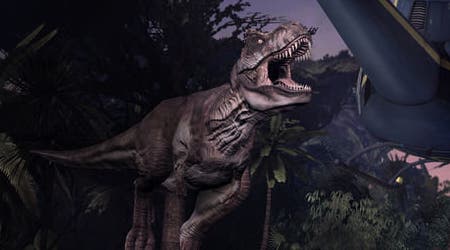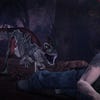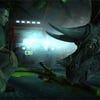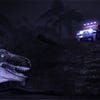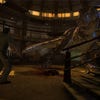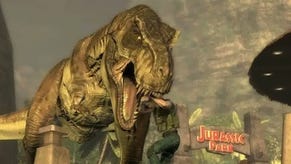Jurassic Park: The Game Review
'Saur loser.
Remember that bit in Jurassic Park when the T-Rex attacks the cars, and the kids are inside, and Jeff Goldblum jumps out of the car with a flare and distracts the dinosaur by pressing up, down?
Or what about the part when Laura Dern is chased out of the electricity substation by raptors and has to dash across open ground to the safety of the visitor's centre by pressing left and right at just the right time?
Hmm. Maybe not.
Like the genetic science John Hammond so cavalierly roped into servicing his quest for glory, the Quick Time Event is a tool often misused by game developers. Used sparingly, it can work wonders, straddling the divide between cut-scene and action and lending a cinematic lustre to moments that would otherwise be entirely passive. Used excessively, it's a fiddly distraction that detracts from the on-screen narrative and reduces player input to pre-school levels.
The Jurassic Park movies have inspired a lot of different gameplay styles, covering everything from fighting games to lightgun shooters and even management simulations - but in adding "adventure game" to the list, Telltale Games has opted to rely on a lot of QTE.
At points, the game is nothing but an elongated sequence of button-matching reaction tests. There's a little more to it than that, but with an over-reliance on such a problematic gameplay mechanism, the effect is much as you'd expect: this is a game that feels more like interactive storybook than a fully-fledged video game in its own right.
That story starts by flitting daintily around the events of the first film, in particular the fate of those stolen dino embryos hidden in a can of fake shaving cream by doomed IT nerd Dennis "Nuh-uh-uh, you didn't say the magic word" Nedry.
The stolen embryos prove central to the fate of our cast of characters. Nima is a Costa Rican thief-for-hire with a personal vendetta against Hammond's In-gen corporation. It's her job to retrieve the can for her employer. Meanwhile, specialist dinosaur veterinarian Gerry Harding has brought his rebellious teen daughter to the island, taking advantage of the park's spectacularly lax attitude to child endangerment in an attempt to steer her away from a life of petty theft, smoking and sullen back chat.
Needless to say, they're all stuck on the island when the dinosaurs get free, and must be rescued by our third group of characters, a trio of wise-cracking mercenaries sent in to scoop up any survivors.
Compared to other attempts to crowbar new stories into existing movie plots, this one fares better than most. We see relatively little of the park in the first movie, so there's plenty of room for our new characters to get into scrapes without tripping over the adventures of Alan Grant, Ian Malcolm and the others. Lord of the Rings: War in the North, this is not.
Sadly, the game never quite grasps the opportunity to add anything meaningful to the franchise. The first of four episodes is the strongest, sticking closely to Spielberg's formula and striking the best balance between the terrifying ferocity of its inhabitants and the sheer awe and wonder they evoke.
The gameplay is never the equal of the inspiration though. There are three basic scenarios you'll have to deal with, but the combination never clicks. The one closest to Telltale's usual style involves panning the camera around a location, looking for things. You don't have to look very hard, as everything of interest has a big question mark attached, which turns into a magnifying glass so you can click on it. There's no inventory to manage, so all you're really doing is triggering information about the environment or telling characters to open the only door available to them. It looks like a game, but never feels like one.
Puzzles are inevitably limited, both in number and scope. The most demanding, arriving in Episode 2, involves using a turntable to remove maintenance trolleys and mount three cars on a rollercoaster track in the correct sequence. Other challenges are little more than sequences of buttons and actions that must be performed in a specific order. Even here, there's little mental effort required as the game often explicitly tells you what needs to be done. All you need to do is follow the script.
The same is true of dialogue scenes where you'll get to converse with the characters, though as your control hops from one to the other, sometimes within the same scene or even conversation, there's never room to identify with any character, or even feel like you're making meaningful decisions. At one point you control both sides of an argument at the same time, essentially bickering with yourself in a scene that goes nowhere and illustrates nothing.
There's not much point searching for depth in the characters, as each sticks closely to their designated archetype but their personality seems to fluctuate from scene to scene, depending on the demands of the story. Rather than coming across as well-rounded individuals with complex goals and needs, they seem more like inconsistent sociopaths, liable to change their personality on a whim.
The attempts at human drama are also poorly served by a particularly weak visual style. More realistic than the usual cartoon Telltale approach, yet blighted by jerky animation and freakish facial expressions, it's hard to warm to these crude digital puppets and emotional investment in their plight suffers accordingly.
It's the constant leaning on the QTE crutch that really drags the experience down, however. There's an obvious Heavy Rain influence at play here, but what works for a thriller with an elastic storyline doesn't translate well to being chased by a T-Rex. Sometimes you're asked to hit buttons or click on things purely to move a scene along, an illusion of interactivity presumably designed to prevent the game from becoming one long cut-scene. Such moments are pointless, but ultimately benign.
It's when the dinos attack that the QTE approach really struggles. Some inputs are generous with their time limits, others demand instant responses, with no rhyme or reason. You can miss an input in one sequence, causing a character to merely stumble, but another will offer only instant death for the slightest mistake. Frequently, they're chained together, and you're given no time to react. Checkpoints pop up after every few input sequences, but often progress comes from memorising what's required rather than reacting to it first time around.
There is some flexibility in the game. Mess up a sequence and you might not be able to grab a distress flare which makes the next section slightly easier, for example. Or you might just die. Not being able to tell which actions are crucial and which merely optional is the source of much frustration in the later episodes.
There are also brief chances to choose between two courses of action, but both ultimately lead to the same pre-destined end point, with no apparent benefit. Just as the QTE gives the appearance of interaction while offering little, so these meaningless branches offer an illusion of choice. The game doesn't keep score, as such, but does award gold, silver and bronze medals for the way you complete each bite-sized scenario and a death tally mocks you with your failed attempts. Should the sight of bronze bother you, there's the option to go back and replay any scene, though there's no compelling reason to do so.
You can hardly blame Telltale for trying something different, given the enormous number of licensed games it's undertaking right now, but Jurassic Park has neither the charm nor ingenuity that the studio is known for. Come the end of the four episodes, each lasting roughly an hour, there's just a strange feeling of emptiness. The game is never interactive enough to make it feel like you've survived a thrilling adventure, nor does it inspire any emotional or intellectual engagement with its characters, situations or story.
Ironically for a series based around the idea of a carefully staged experience that collapses into unpredictable chaos, you're always more passenger than participant on this visit to Jurassic Park.
